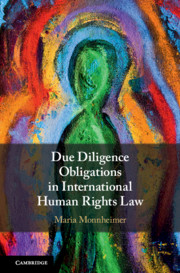Book contents
- Due Diligence Obligations in International Human Rights Law
- Due Diligence Obligations in International Human Rights Law
- Copyright page
- Contents
- Acknowledgments
- Abbreviations
- Introduction
- 1 Why to Analyze State Responsibility for Human Rights Violations: The Flawed Debate on Direct Human Rights Obligations for Non-State Actors
- 2 Establishing State Responsibility for Human Rights Violations: Proposal for a Conduct-Based Typology of Human Rights Obligations
- 3 The Origins of Due Diligence in International Law
- 4 The Components of the Due Diligence Standard
- 5 Lessons to Be Learned from the Application of Due Diligence Obligations in Other Fields of International Law
- 6 Applying the Due Diligence Framework to the Field of Human Rights Protection
- 7 A Case for Extraterritorial Due Diligence Obligations in the Human Rights Context
- Summary and Outlook
- Index
4 - The Components of the Due Diligence Standard
Published online by Cambridge University Press: 05 February 2021
- Due Diligence Obligations in International Human Rights Law
- Due Diligence Obligations in International Human Rights Law
- Copyright page
- Contents
- Acknowledgments
- Abbreviations
- Introduction
- 1 Why to Analyze State Responsibility for Human Rights Violations: The Flawed Debate on Direct Human Rights Obligations for Non-State Actors
- 2 Establishing State Responsibility for Human Rights Violations: Proposal for a Conduct-Based Typology of Human Rights Obligations
- 3 The Origins of Due Diligence in International Law
- 4 The Components of the Due Diligence Standard
- 5 Lessons to Be Learned from the Application of Due Diligence Obligations in Other Fields of International Law
- 6 Applying the Due Diligence Framework to the Field of Human Rights Protection
- 7 A Case for Extraterritorial Due Diligence Obligations in the Human Rights Context
- Summary and Outlook
- Index
Summary
The fourth chapter develops an abstract analytical framework of the different components of an international due diligence standard. It seeks to deduce those elements which due diligence obligations contain generally and irrespective of their application to specific fields of international law. With knowledge, capacities, and reasonableness three major components are identified: If a state knows of potential violations of international law, it is obliged to employ the reasonably available means at its disposal to prevent such violations or to sanction them should they occur nonetheless. The chapter then discusses common problems inherent in the application and implementation of due diligence obligations. Most notably, it elaborates on how the foreseeability threshold might be overcome; how the problem of diverging capacities could be addressed and whether all states have to adhere to the same standards of diligence; and finally how the vague and broad notion of reasonableness can be given substantial meaning.
- Type
- Chapter
- Information
- Due Diligence Obligations in International Human Rights Law , pp. 116 - 141Publisher: Cambridge University PressPrint publication year: 2021

